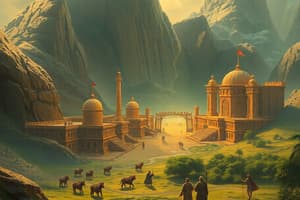Podcast
Questions and Answers
In which ancient civilization did the Sumerians live?
In which ancient civilization did the Sumerians live?
- Ancient Rome
- Ancient Greece
- Ancient Egypt
- Mesopotamia (correct)
What was the main event that marked the end of the Roman Empire?
What was the main event that marked the end of the Roman Empire?
- Fall of Rome (correct)
- Roman Republic
- Fall of Constantinople
- Pax Romana
What was the main impact of the Black Death?
What was the main impact of the Black Death?
- 1/5 of Europe's population was killed
- 1/4 of Europe's population was killed
- 1/3 of Europe's population was killed (correct)
- 1/2 of Europe's population was killed
What was the main characteristic of the Renaissance?
What was the main characteristic of the Renaissance?
What was the main cause of the Crusades?
What was the main cause of the Crusades?
What was the main consequence of the Industrial Revolution?
What was the main consequence of the Industrial Revolution?
What was the main event that marked the beginning of World War II?
What was the main event that marked the beginning of World War II?
What was the main characteristic of the Enlightenment?
What was the main characteristic of the Enlightenment?
What is a characteristic of the Contemporary Era?
What is a characteristic of the Contemporary Era?
Flashcards are hidden until you start studying
Study Notes
Ancient Civilizations
- Mesopotamia: Cradle of civilization, Sumerians (3500 BCE), Babylonians, Assyrians
- Ancient Egypt: Pyramids (2580 BCE), Pharaonic dynasties (3100 BCE - 30 BCE), Hieroglyphics
- Ancient Greece: City-states (Athens, Sparta), Philosophy (Socrates, Plato, Aristotle), Theater (Tragedy, Comedy)
- Ancient Rome: Republic (509 BCE), Empire (27 BCE), Law, Architecture, Engineering
Middle Ages
- Fall of Rome: 476 CE, Barbarian Invasions, Decline of Empire
- Feudalism: Lords, Vassals, Knights, Serfs
- Crusades: Christian Holy Wars (1095-1291)
- Black Death: Pandemic (1346-1353), 1/3 of Europe's population
Early Modern Period
- Renaissance: Revival of Classical Culture (14th-17th centuries)
- Age of Exploration: European Discoveries (15th-16th centuries)
- Reformation: Protestantism (1517), Catholic Counter-Reformation
- Enlightenment: Reason, Science, Democracy (17th-18th centuries)
Modern Period
- Industrial Revolution: Mechanization, Factory System (18th-19th centuries)
- Nationalism: Rise of Nation-States, Imperialism (19th-early 20th centuries)
- World War I: Global Conflict (1914-1918), Treaty of Versailles
- World War II: Global Conflict (1939-1945), Holocaust, Atomic Bomb
Contemporary Era
- Cold War: Ideological Conflict (1945-1991)
- Decolonization: End of Colonialism (mid-20th century)
- Globalization: Economic Interdependence, Digital Age (late 20th century-present)
- Modern Conflicts: Regional Wars, Terrorism, Refugee Crises
Ancient Civilizations
- Mesopotamia: Founded around 3500 BCE, home to Sumerians, Babylonians, and Assyrians, known as the cradle of civilization.
- Ancient Egypt: Built pyramids around 2580 BCE, had pharaonic dynasties from 3100 BCE to 30 BCE, and developed hieroglyphics.
- Ancient Greece: Consisted of city-states like Athens and Sparta, was the birthplace of philosophy (Socrates, Plato, Aristotle), and invented theater (tragedy and comedy).
- Ancient Rome: Transformed from a republic (509 BCE) to an empire (27 BCE), developed law, architecture, and engineering, and left a lasting legacy.
Middle Ages
- Fall of Rome: Occurred in 476 CE, marking the decline of the empire and the rise of barbarian invasions.
- Feudalism: A social hierarchy consisting of lords, vassals, knights, and serfs, characterized by a system of obligations and dependencies.
- Crusades: A series of Christian holy wars (1095-1291) aimed at reclaiming the Holy Land from Muslim rule.
- Black Death: A devastating pandemic (1346-1353) that wiped out one-third of Europe's population.
Early Modern Period
- Renaissance: A cultural and intellectual revival (14th-17th centuries) that revived classical culture and ideals.
- Age of Exploration: A period of European discoveries (15th-16th centuries) that expanded global trade and exploration.
- Reformation: A Protestant movement (1517) that challenged Catholicism and led to the Catholic Counter-Reformation.
- Enlightenment: An intellectual and philosophical movement (17th-18th centuries) that emphasized reason, science, and democracy.
Modern Period
- Industrial Revolution: A transformative period (18th-19th centuries) marked by mechanization, the factory system, and the emergence of a new industrial economy.
- Nationalism: A movement that led to the rise of nation-states and imperialism (19th-early 20th centuries).
- World War I: A global conflict (1914-1918) that ended with the Treaty of Versailles and redrew the global map.
- World War II: A global conflict (1939-1945) that resulted in the Holocaust, the atomic bomb, and a new world order.
Contemporary Era
- Cold War: An ideological conflict (1945-1991) between the United States and the Soviet Union that shaped global politics and international relations.
- Decolonization: A process (mid-20th century) that marked the end of colonialism and the emergence of new independent nations.
- Globalization: A phenomenon characterized by economic interdependence, digitalization, and increased global connectivity (late 20th century-present).
- Modern Conflicts: Ongoing regional wars, terrorism, and refugee crises that continue to shape global politics and international relations.
Studying That Suits You
Use AI to generate personalized quizzes and flashcards to suit your learning preferences.




